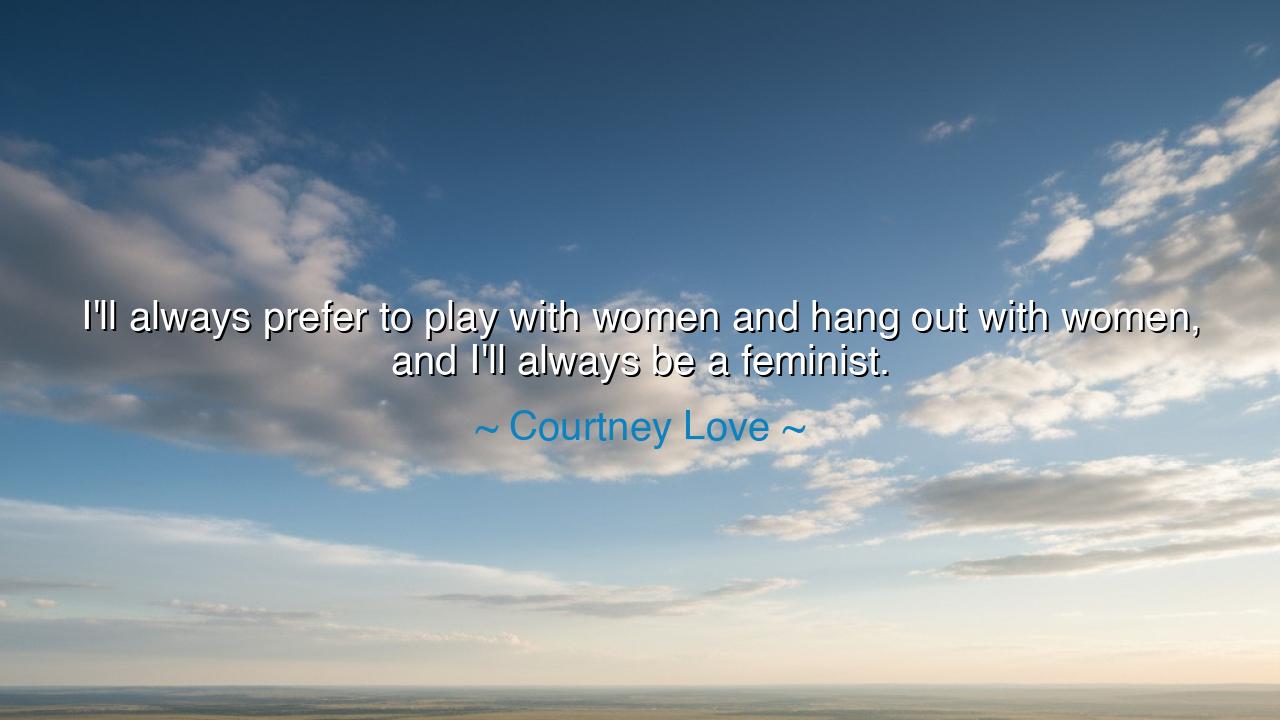
I'll always prefer to play with women and hang out with women
I'll always prefer to play with women and hang out with women, and I'll always be a feminist.






The words of Courtney Love, “I’ll always prefer to play with women and hang out with women, and I’ll always be a feminist,” are the fiery vow of one who has walked through the storms of art, fame, and scorn, yet still holds her allegiance to her sisters. In them lies a declaration of loyalty: to seek strength, companionship, and creativity among women, rather than surrendering to the traditions that exalt men as the natural center of every stage. It is the cry of solidarity, born of both defiance and love.
The origin of such conviction is carved from centuries of struggle where women were set against each other by custom, competition, and scarcity. In music, in art, in politics, women were often made to believe there was room for only one of them at the table. To choose instead to play with women, to create and dwell among them in kinship, is to reject this false scarcity and to embrace abundance—the truth that when women unite, they multiply one another’s power.
Consider the story of the suffragettes, who banded together across nations at the dawn of the twentieth century. Though mocked, beaten, and imprisoned, they chose to “hang out” with one another in meetings, marches, and jails, drawing from that shared spirit the courage to face empires. Alone, each woman was vulnerable; together, they were unstoppable. Their victories gave proof to the wisdom Love voices: that feminism thrives not in isolation, but in communion.
Love’s words also shine with the essence of feminism—a belief not only in the equality of women, but in their right to joy, companionship, and power together. To “prefer” the company of women is not exclusion, but affirmation: a recognition that women’s voices, laughter, and art are enough in themselves, complete and radiant without validation from men. This is a philosophy of strength, declaring that the bonds of sisterhood are not secondary, but sacred.
The lesson is clear and timeless: to be a feminist is to honor the power of women in every space, from the stage to the street, from the hearth to the halls of power. To stand with them is to amplify their voices, to resist the forces that seek to divide, and to proclaim that women’s presence is not an exception to greatness, but its equal and rightful form.
Let future generations remember: the strength of women lies not only in what they achieve individually, but in what they choose to build together. And when they play together, when they stand together, when they live in solidarity, the world is reshaped. For the power of feminism is not a whisper, but a chorus, rising ever louder until justice and joy are shared by all.






LTLinh Tran
I really appreciate Courtney Love’s unapologetic feminism and her clear preference for women’s company, but I’m curious how her stance impacts her relationships with men. Can you still be a strong feminist and have healthy, supportive relationships with men, or does it require separating oneself from male-dominated environments? How do we balance gender solidarity with the need for inclusivity in the fight for equality?
VQVinhhh quoc
Courtney Love’s quote made me think about the complexity of gender dynamics. While it’s empowering for a woman to openly embrace her feminist identity and bond with other women, can there also be an opportunity to build bridges with men to foster mutual understanding and collaboration? How can we navigate a world where both women and men work together toward equality, while still maintaining the integrity of feminist values?
KNKa Nguyen
Courtney Love’s stance on feminism and her preference for women both in work and social settings is a powerful statement. It shows a commitment to solidarity and empowerment among women. But I wonder, does this also imply a rejection of male perspectives? Is there a balance between being a feminist and recognizing the value of diverse voices, regardless of gender? How do we ensure that feminism is inclusive while still advocating for women’s empowerment?
HY43 Nguyen Thi Hai Yen_11A2
I admire Courtney Love for openly identifying as a feminist and preferring to be around women. It challenges traditional gender norms that often prioritize male friendships and dominance. But is there a risk of reinforcing the idea that women should segregate themselves from men in all contexts? Shouldn’t feminism also include the importance of fostering equality in both male and female spaces, without making one gender feel excluded?
Nnguyen
Courtney Love’s statement about preferring to be around women and identifying as a feminist is empowering. It’s refreshing to see someone publicly embrace both their love for women and their commitment to feminist ideals. But I wonder, does this preference for women in her social and professional circles also reflect a broader critique of male-dominated spaces? How can we ensure that women are equally respected and supported in spaces traditionally dominated by men?